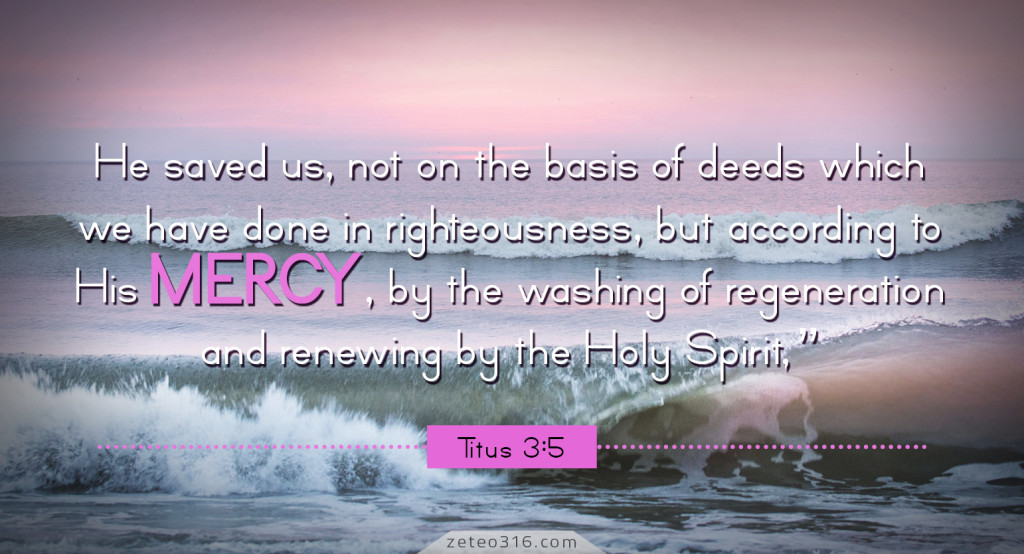Today’s Inspiration – M is for Mercy
He saved us, not on the basis of deeds which we have done in righteousness, but according to His mercy, by the washing of regeneration and renewing by the Holy Spirit,
Titus 3:5
To view mercy in its real character, we must go to Calvary. It is not sufficient to contrast the purity of God with the impurity of man. That indeed affords us some view of what mercy must be to reach the depths of the fall–a side face of that precious attribute. But to see its full face shining upon the redeemed, we must go by faith, under the secret teachings and leadings of the Holy Spirit, to see “Immanuel, God with us,” groveling in Gethsemane’s garden. We must view him naked upon the cross, groaning, bleeding, agonizing, dying. We must view Godhead and manhood united together in the Person of a suffering Jesus; and the power of the Godhead bearing up the suffering manhood. We must view that wondrous spectacle of love and blood, and feel our eyes flowing down in streams of sorrow, humility, and contrition at the sight, in order to enter a little into the depths of the tender mercy of God. Nothing but this can really break the sinner’s heart.
“Law and terrors do but harden,
All the while they work alone;
But a sense of blood-bought pardon
Soon dissolves a heart of stone.”
Law terrors, death and judgment, infinite purity, and eternal vengeance will not soften or break a sinner’s heart. But if he is led to view a suffering Immanuel, and a sweet testimony is raised up in his conscience that those sufferings were for him–this, and this only will break his heart all to pieces. Thus, only by bringing a sweet sense of love and blood into his heart does the blessed Spirit show a sinner some of the depths of the tender mercy of God.
SOURCE: J. C. Philpot.
Three words in English, “He saved us.” In those simple words you have the core of the Christian faith, it’s all about salvation, it’s all about God saving sinners. The word “saved” has become a distinctively Christian term, though in the Greek language the original verb sozo which is translated “saved” could mean temporal deliverance. It was a word used to describe rescuing someone from danger, preserving someone safe from harm, delivering someone out of potential ruin and disaster, salvaging someone in the midst of death. In fact, in Matthew’s gospel a number of times there are such usages of the word in temporal ways. One comes to mind particularly in Matthew 8:25 where the disciples who were in a storm on the sea of Galilee said, “Save us, Lord, we’re perishing.” And they weren’t talking about spiritual salvation, they were talking about physical deliverance from a storm that was about to take their lives. So the verb speaks of rescuing someone in imminent grave serious and even permanent danger or disaster.
In the spiritual sense, however, which is its main usage in the New Testament it has the idea from being saved from sin, being rescued from sin, from sin’s power, from sin’s penalty, being preserved therefore safe and unharmed from divine wrath, from judgment, from hell, from eternal punishment. We know and love the word. We understand what it means. We talk about being saved. We talk about salvation. We remember the words of the Apostle Paul who said in writing to Timothy, “Christ Jesus came into the world to save sinners, to rescue otherwise doomed and damned sinners.”
…
“He saved us.” Simply it reflects the fact that salvation is totally the work of God. That’s what it’s saying…He saved us. Paul is emphasizing the independent, uninfluenced sovereignty with which God saves, totally outside of us, He saved us. The point being that we couldn’t do anything about our condition. We were hopeless, dead in trespasses and sins. We could do nothing, He saved us.
Now as we look more closely at this sovereign salvation, we’re going to see how that that idea that God is sovereign in the whole work of salvation unfolds in a seven-fold way. Okay? There are seven aspects to God saving us. And they flow around that statement “He saved us.” Here they are. He saved us by His kindness, by His love, by His mercy, by His regeneration, by His Spirit, by His Son and by His grace. That is the seven-fold divine operation that brings about our rescue. These verses form one long sentence, sweeping over the divine sovereign initiation and accomplishment of the reality of salvation. We’re going to look at these seven aspects that tell us how He saved us.
First, He saved us, number one, by His kindness…by His kindness. Verse 4, “But when the kindness of God our Savior and His love for mankind appeared, He saved us.” It was kindness that caused God to effect a saving plan. God is kind. What do we mean by that? The word literally means “goodness of heart.” It means that He has a concern in His heart toward people in misery. God is basically good. He is inherently good. He is inherently kind.
SOURCE: This is an excerpt of the article that originally appeared here at Grace to You.
Copyright 2015, Grace to You. All rights reserved. Used by permission.
The inspiration for these alphabet verses came from Crossroad

